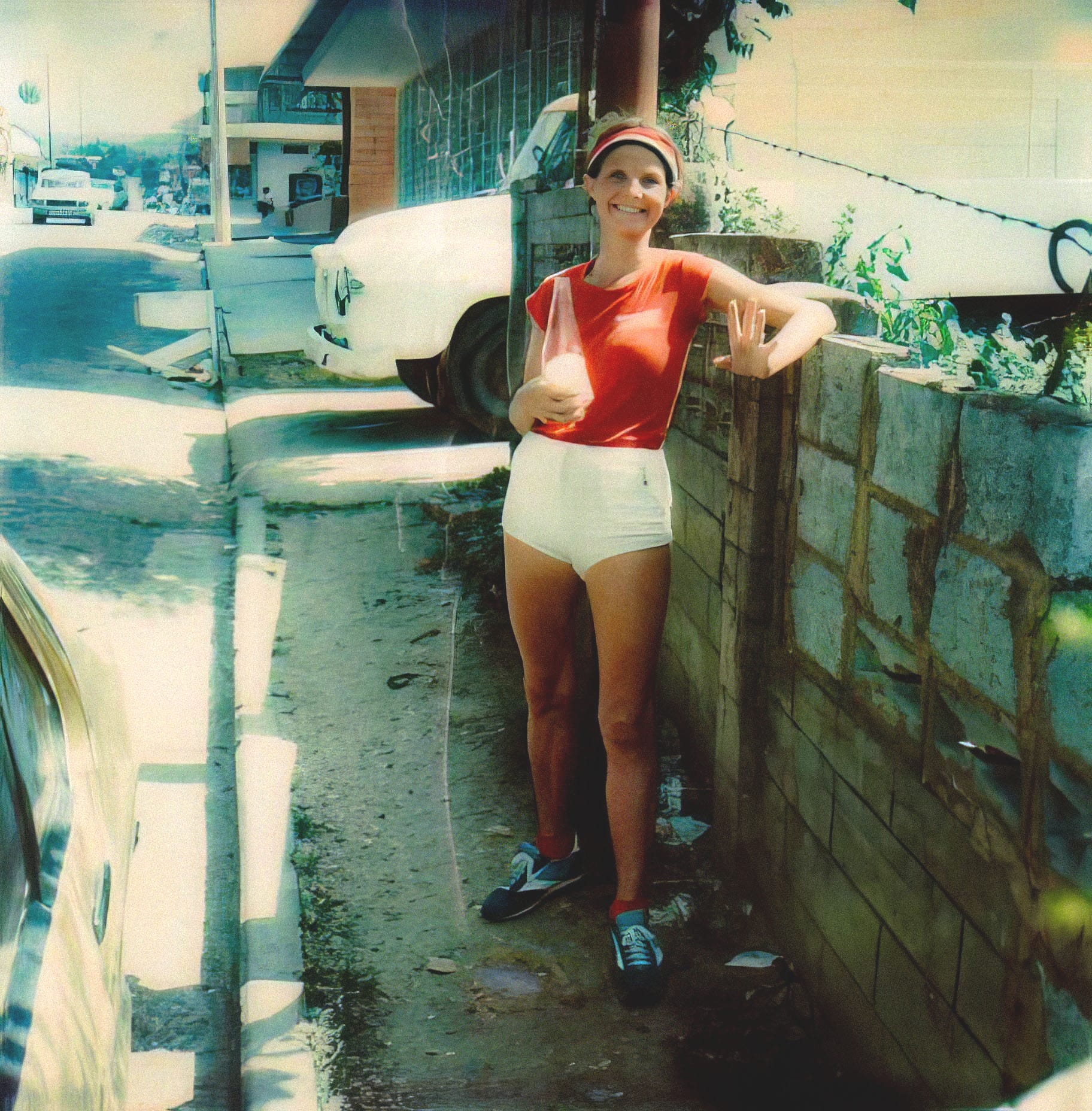Chicked!

My mid-twenties found me living in the small Caribbean island of Trinidad. My then husband Mike had just finished dental school and was offered a way to amortize his school loans by serving in an underserved country. We were given a half dozen options, and we chose Trinidad, mostly because they spoke English and the government seemed stable. (Learning to drive on the left was a temporary bump in the road, so to speak.) As it turns out, there was a lot more to like about Trinidad—as a former British Colony and a part of the Commonwealth, there were strong colonial ties, with a history not all that dissimilar to the U.S. (A large African population originally captured as slave labor, in Trinidad’s case, to work the sugar cane plantations.) During WWII, Americans had a military base there to protect oil fields and shipping lanes. So Americans by and large were welcomed by a friendly and outgoing population.
By the mid-70s, the country was awash in oil money as it shared the wealth with just-off-the-coast Venezuela, which itself was, back then, a well-heeled democracy replete with high-end stores guarded by armed soldiers. Trinidad (and its sister island Tobago) was a vibrant place to be in the 70s—a Carnival to rival Rio’s, steel bands (drums fabricated from the containers from the aforementioned oil fields), and even a burgeoning beauty scene with the crowning of its first Miss Universe in 1977, Penny Commissiong.
What it didn’t have was dentists, owing to the significant brain drain of their best and brightest who often remained in Toronto, London, or New York once they’d completed their training. So while Mike was busy tending teeth (one of his patients was the Prime Minister), I busied my days with proctoring tests for the U.S. embassy, becoming an avid bread baker, and, eventually, running.
Following Frank Shorter’s marathon win in Munich in 1972, the U.S. collectively stubbed out its cigarettes and started “jogging.” The craze grew and by 1975, something like 25 million Americans incorporated some version of regular running into their daily routine. And it wasn’t just the U.S.--the U.K., Europe, Australia, New Zealand, and their Commonwealth sisters all pulled on their collective trainers and hit the road.
My first tentative run steps I owe to my brothers who had taken up the popular Kenneth Cooper fitness plan he coined as “Aerobics.” Cooper assigned points to different physical activities (e.g., an hour of walking is 2 points, an hour of running is 4 points, etc.). The goal was to amass, say, 30 points a week in order to be “fit.” I had myself been casting about for a way to avoid the dreaded middle-age spread, and running seemed to be a good fit. It didn’t require much equipment (just shoes), you didn’t have to go to a special place (like a gym) and a lot of calories could be burned in just a few minutes. Efficient and inexpensive.
Meanwhile, back in Trinidad, my first run effort was a simple round-the-block loop. It took about 5 minutes, tops. After a few days, that seemed wholly inadequate, so I did the loop twice. Then three times. At a certain point, repetitive loops gave way to finding longer routes. And for those of us with Sheldon Cooper tendencies (“but Tuesday is oatmeal day!”) it was easy to get accustomed to longer and unyielding routines.
And so it was that I eventually became known as that white lady who runs. I never considered competing (a little before the era of ubiquitous neighborhood 5ks) though I did get pulled over one day on a run by a local track and field coach asking if I’d like to participate in an upcoming track meet. (Another story altogether.) But the big ask came one day when a neighbor, the country’s soccer coach, asked for a favor. He was putting on one of those fundraiser runs where friends and families pledge, say, a dollar a mile, in order to raise money for an overseas trip, or uniforms, or whatever. The coach was injured and asked if I would run in his place to make good on all the pledges he’d already acquired. The route started in Chaguaramas, the site of the American WWII base in the northwest corner of the island, and would finish at the Capitol in Port-of-Spain, about 14k in total, or almost 9 miles, a flat, meandering road with mostly the ocean to our right and the hills of Port-of-Spain to our left. I said yes.
Race day came and it was clear that I would be the only woman in the field. It was not a big race, maybe 35 runners altogether, almost all of them members of the soccer squad. By then a nine-mile run was not a tall ask for me. My aim was to motor along, enjoy the day, and finish so that Coach could collect his pledges. Apparently that was not the goal for many of the young men there. Pluncking a number on their chest immediately became a reason to rip the legs off their mates. My own modest ambition was to simply stay out of their way. But one of the young Alphas, coffee-skinned with freckles and a giant red Afro, pre-race noted my presence and made a point to walk over to me, wag his finger in my face, and declare menacingly that “No chick has ever beaten me in a race!”

I had enlisted a friend/chaperone to run with me, a pastor at our church. While David had the demeanor of Mr. Rogers, he had the body of Bad, Bad Leroy Brown. Nobody messed with David, not even my freckled red Alpha. David and I were regular running partners and were accustomed to pacing long, slow miles. Unlike soccer players who are themselves more familiar with short, hard bursts of speed. So when the starting gun went off, 33 young men took off like so many Usain Bolts, doomed to entertain the monkey on their collective backs for the next couple of hours.
And as anyone might have predicted, one by one the distressed soccer players started coming back to us. Eventually there appeared a makeshift sag wagon, a pickup truck who would pluck up beleaguered racers who had tapped out. Soon enough the showdown I had dreaded appeared up ahead: the slowing of Mr. Red who declared he had never been what is now called “chicked.”
Mr. Red was way ahead of racing terminology. As more and more women entered formerly male-only races in the 70s, (The Boston Marathon famously came to blows with a “bandit” female runner just a few years earlier) races had to come to terms with faster women. Even as late as 1972, the AAU (Amateur Athletic Union) demanded separate start times for women, a “separate but equal” approach that saw the six female entrants in the New York City Marathon stage a 10-minute sit-in (the start time differential) that delayed the start of the race. (My favorite protest sign of the “six who sat” --“This is 1972!”)
Since then, for most men, coed races are an inclusive, welcome expansion of a beloved sport. Passing a slower man is often met with a “way to go” to modern day Atalantas as they speed by. But for a few men, being bested by “the weaker sex” is unsettling. Most female runners are familiar with this type, as he speeds up, and in some cases even blocks her as she attempts to pass. This phenomenon has come to be called being “chicked.” One can even buy a T-shirt with a “you’ve just been chicked” printed on the back, just to make the point.
As I approached “he who shall not be chicked,” I tried to blend in to the scenery, hiding behind David’s formidable torso. The pass was swift and, for me, painless, until I began ruminating about a finish line confrontation. But it was early in the running boom, and this was a casual, no awards affair. The plan was to finish, find the marshall who tallied miles for pledges, and leave, like Homer Simpson disappearing into the bushes. No podiums, no medals, no frills.
Out of the 35 runners, I finished 8th. I was pleased, having never raced before, feeling I had acquitted myself well for my injured neighbor. As David and I tidied up, got water, and prepared to leave, I spied a familiar red tangle of Afro bouncing its way towards me. I stiffened, hoping that whatever thrashing or tongue-lashing might be imminent, it would be swift. Red towered above me, invading my space, quickly thrust out his hand to shake mine and said “Nice race chick.” And just like that, he was gone.
I’ve often wondered if this generous expression of sportsmanship was just who he was, quick to confront but also quick to concede, or if maybe being bested by a woman wasn’t so painful after all, maybe allowing that crack in his Alpha armor to shine in a little light. The competitive world was shifting under his feet, and he could either fight it, or allow it in with an open heart and an open hand.



Member discussion